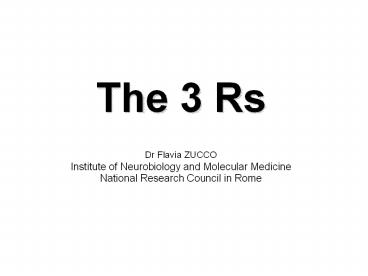Dr Flavia ZUCCO - PowerPoint PPT Presentation
1 / 10
Title:
Dr Flavia ZUCCO
Description:
a proposition or situation offering a choice between two or more things, only ... (Webster Dictionary, MERRIAM-WEBSTER INC., Publishers, Springfield, Massachusetts, ... – PowerPoint PPT presentation
Number of Views:30
Avg rating:3.0/5.0
Title: Dr Flavia ZUCCO
1
The 3 Rs
Dr Flavia ZUCCO Institute of Neurobiology and
Molecular Medicine National Research Council in
Rome
2
Definition of alternative - a proposition or
situation offering a choice between two or more
things, only one of which may be chosen - an
opportunity for deciding between two or more
courses or proposition. A. offering or
expressing a choice B. existing or functioning
outside the established cultural, social or
economic system. (Webster Dictionary,
MERRIAM-WEBSTER INC., Publishers, Springfield,
Massachusetts, U.S.A.).
3
Milestones in the 3Rs history 1954 C.V.
Hume Promoting a study on a humane experimental
technique UFAW (Universities Federation for
Animal Welfare, founded in 1938) 1959 W.M.S.
Russell R.L. Burch The Principle of Humane
Experimental Techniques London Methuen. 1978 D.
H. Smyth Alternatives to animal experiments.
London Scolar Press. 1986 Council Directive
86/609/EEC Council of Europe Convention
ETS 123
4
Russell Burch 3Rs definitions Replacement
(1959) means the substitution for conscious
living higher animals of insentient
material. Replacement(1992) Any scientific
method employing non-sentient material which may
in the history of experimentation replace methods
which use conscious living vertebrates
(distinguish between relative and absolute
replacement). Reduction (1959) means reduction
in the numbers of animal used to obtain
information of a given amount and
precision. Reduction (1992). The use of animals
should be reduced to the absolute minimum that is
required to meet the experimental
objectives. Refinement (1959) means any decrease
in the incidence or severity of inhumane
procedures applied to those animals which still
have to be used. Refinement (1992) means simply
to reduce to an absolute minimum the amount of
stress imposed on those animals that are still
used.
5
Smyths definition of alternatives All
procedures which can completely replace the need
for animal experiments, reduce the numbers of
animals required, or diminish the amount of pain
or distress suffered by animals in meeting the
essential needs of man and other animals.
6
The 3Rs in the European Directive (86/609/EEC,
Art. 7) 7.2 An experiment shall not be
performed if another scientifically satisfactory
method of obtaining the result sought, not
entailing the use of an animal, is reasonably and
practicably available. 7.3 When an experiment
has to be performed, the choice of species shall
be carefully considered and, where necessary,
explained to the authority. In a choice between
experiments, those which use the minimum number
of animals, involve animals with the lowest
degree of neurophysiological sensitivity, cause
the least pain, suffering, distress or lasting
harm and which are most likely to provide
satisfactory results should be selected. 7.4 All
experiments shall be designed to avoid distress
and unnecessary pain and suffering to the
experimental animals.
7
The Anim.Al.SEE Project QLG6-2001-00028 (Animal
Alternatives Scientific/Ethical
Evaluation) Alternative methods in animal
experimentation. Evaluating scientific, ethical
and social issues in the 3Rs context.
8
Premises Moderates are left in an ill-defined
ethical no-mans-land in which a great deal of
philosophical analysis is available, but little
in the way of practical advice. Indeed,
scientists defence of animal experiments is
surprisingly simplistic for a section of society
that prides itself on its intellect. we need
a tool-kit to help apply the philosophical ideal
to the practical environment of the
laboratory. (D.G. Porter, 1992. Ethical scores
for animal experiments, Nature, vol.356, p.
101-102.)
9
Revision of languages and concepts in
science F. Wilczek (2001) When words fail -
Scientists have to struggle with words that dont
fit reality. (Nature vol. 410, p. 149) B.
Bensaude-Vincent (2001) Chemical analysis
Language reform played an integral role in the
development of a discipline. (Nature vol. 410, p.
415.) A.A. Kiessling (2001) In the stem-cell
debate, new concepts need new words. (Nature vol.
413, p. 453.) A. Wallace (2002) The emerging
conceptual framework of evolutionary
developmental biology. (Nature vol. 415, p. 757.)
10
From Hume to Hume Indulge your passion for
science, but let your science be human, and such
as may have direct reference to action and
society D. Hume (1711-1776) Enquiry concerning
human understanding. Introduction, 9.































